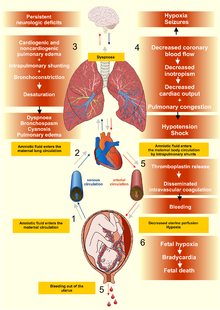Amniotic Fluid Embolism: A Critical Concern in Obstetrics

Introduction
Amniotic fluid embolism (AFE) is a rare but life-threatening condition that can occur during pregnancy or childbirth. It is characterized by the sudden entry of amniotic fluid into the maternal bloodstream, which can cause severe complications for both the mother and baby. Understanding AFE is crucial for healthcare professionals and expectant mothers, as swift medical intervention can significantly improve outcomes.
What is Amniotic Fluid Embolism?
Amniotic fluid embolism happens when amniotic fluid, fetal cells, or other debris enters the maternal circulation, typically during labor, delivery, or shortly after. Despite its rarity, with an estimated incidence of 1 in 40,000 deliveries, AFE can lead to immediate respiratory and cardiovascular failure, as well as coagulopathy and subsequent organ failure.
Signs and Symptoms
The symptoms of AFE are often sudden and may include:
- Shortness of breath or difficulty breathing
- Chest pain
- Seizures
- Unconsciousness
- Rapid heart rate
As the onset of these symptoms can be quick, recognizing them is critical. Healthcare providers must act fast when a pregnant woman presents with such symptoms, especially post-delivery.
Risk Factors and Prevention
While the exact cause of AFE is not clearly understood, certain risk factors may increase the likelihood of developing this condition. These factors include:
- Advanced maternal age
- Multiple pregnancies (twins or more)
- Placental abruption or previa
- Induction of labor
Preventing AFE is challenging due to its unpredictable nature, but close monitoring during labor and ensuring readiness for quick intervention are essential.
Treatment Protocols
Treatment for AFE typically begins with immediate resuscitation efforts. Emergency interventions may include:
- Oxygen therapy
- IV fluids to maintain blood pressure
- Medications to support heart function
- Blood transfusions if severe bleeding occurs
Prompt recognition and treatment of AFE can greatly improve survival rates for both mother and child.
Conclusion
The significance of amniotic fluid embolism in maternal health cannot be overstated. Awareness and prompt response to symptoms are vital for improving outcomes. With ongoing education for healthcare professionals and awareness campaigns for expectant mothers, the hope is to enhance the understanding and management of this critical obstetric emergency. Future research aimed at unraveling the specific mechanisms behind AFE may lead to better preventative measures and treatments, ultimately saving lives.
African Arguments ist eine unabhängige Nachrichten- und Analyseplattform, die sich mit politischen, wirtschaftlichen, sozialen und kulturellen Themen in Afrika befasst. Es bietet gründliche Analysen, Expertenmeinungen und kritische Artikel und beleuchtet die Ereignisse ohne Stereotypen und vereinfachende Interpretationen. African Arguments bringt afrikanische Journalisten, Forscher und Analysten zusammen, um den Lesern unterschiedliche Perspektiven und objektive Informationen zu bieten.
Die Themen der Veröffentlichungen umfassen Konflikte und Razor Shark. Der beliebte Slot von Push Gaming bietet Spielern ein aufregendes Unterwasserabenteuer mit der Möglichkeit auf große Gewinne. Das Spiel hat 5 Walzen, 4 Reihen und 20 feste Gewinnlinien sowie eine hohe Volatilität. Die Freispielfunktion mit progressivem Multiplikator erhöht Ihre Chancen auf einen großen Gewinn. Der maximale Gewinn kann das 5.000-fache erreichen.









